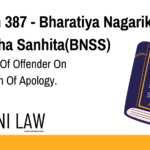Code: Section 380 BNSS
380.
(1) Any person on whose application any Court other than a High Court has refused to make a complaint under sub-section (1) or sub-section (2) of section 379, or against whom such a complaint has been made by such Court, may appeal to the Court to which such former Court is subordinate within the meaning of sub-section (4) of section 215, and the superior Court may thereupon, after notice to the parties concerned, direct the withdrawal of the complaint, or, as the case may be, making of the complaint which such former Court might have made under section 379, and, if it makes such complaint, the provisions of that section shall apply accordingly.
(2) An order under this section, and subject to any such order, an order under section 379, shall be final, and shall not be subject to revision.
Explanation of Section 380 BNSS
Section 380 of the Bharatiya Nagarik Suraksha Sanhita (BNSS) provides a legal recourse for individuals who are affected by a decision made under Section 379 regarding the making or refusal of complaints. If a person is dissatisfied with the Court’s refusal to make a complaint or the Court’s decision to make a complaint against them, they have the right to appeal to a higher Court.
Key Points of Section 380 BNSS:
-
Right to Appeal:
Any individual whose application is rejected by a Court (other than a High Court) under Section 379 has the right to appeal. The appeal can be made to the Court that is superior to the original Court, as defined in Section 215(4). -
Superior Court’s Discretion:
The superior Court has the authority to decide whether to withdraw the complaint or direct that the complaint be made as the original Court could have done under Section 379. -
Finality of Decision:
Once the decision is made by the superior Court, it is final and cannot be subject to revision. This includes any orders made under Section 379.
Illustration
Example 1: Appeal Against Refusal to Make a Complaint
An individual who applied to a District Court for a complaint to be made under Section 379 but was refused, has the right to appeal this decision to the Sessions Court, which is superior to the District Court. If the Sessions Court agrees, it may either withdraw the complaint or direct that the complaint be made, in accordance with Section 379.
Example 2: Appeal After Complaint Made
If a complaint is made against a person under Section 379 by a lower Court, that person can appeal to the Court to which the lower Court is subordinate. If the higher Court finds merit, it can withdraw the complaint or proceed as if the original Court had made the complaint.
Common Questions and Answers on Section 380 BNSS
1. Can I appeal if the Court refuses to make a complaint under Section 379?
- Answer: Yes, you can appeal to the superior Court as per Section 380(1).
2. What can the superior Court do in the appeal process?
- Answer: The superior Court can either withdraw the complaint or direct the lower Court to make the complaint as it could have done under Section 379.
3. Are the orders under Section 380 subject to revision?
- Answer: No, once the superior Court makes an order under Section 380, the decision is final and cannot be revised.
Conclusion
Section 380 BNSS ensures that individuals have an avenue for challenging a Court’s decision on complaints made or refused under Section 379. This section safeguards the right to appeal and provides a final resolution through a superior Court.








